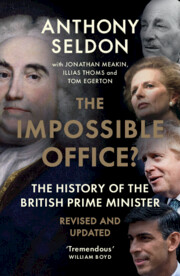247 results
Chapter 6 - The French Revolution
- from Part I - Life and Times
-
-
- Book:
- Goethe in Context
- Published online:
- 16 May 2024
- Print publication:
- 23 May 2024, pp 57-65
-
- Chapter
- Export citation
6 - Possible Solutions for Protectionist Anti-dumping Procedures
-
- Book:
- Improving Procedural Justice in Anti-Dumping Investigations
- Published online:
- 09 May 2024
- Print publication:
- 16 May 2024, pp 191-224
-
- Chapter
- Export citation
From Cadres to Managers: The Double-hundred Action Programme and China's State-owned Enterprise Reform
-
- Journal:
- The China Quarterly , First View
- Published online by Cambridge University Press:
- 08 May 2024, pp. 1-19
-
- Article
-
- You have access
- Open access
- HTML
- Export citation
Bishops in the House of Lords: fit for the future?
-
- Journal:
- Ecclesiastical Law Journal / Volume 26 / Issue 2 / May 2024
- Published online by Cambridge University Press:
- 09 May 2024, pp. 147-180
- Print publication:
- May 2024
-
- Article
-
- You have access
- HTML
- Export citation
In defence of the Chancellor: a personal perspective
-
- Journal:
- Ecclesiastical Law Journal / Volume 26 / Issue 2 / May 2024
- Published online by Cambridge University Press:
- 09 May 2024, pp. 195-208
- Print publication:
- May 2024
-
- Article
-
- You have access
- HTML
- Export citation
Agendas of Reform: Continuity and Change in Australia’s National Disability Insurance Scheme (NDIS)
-
- Journal:
- Social Policy and Society , First View
- Published online by Cambridge University Press:
- 01 April 2024, pp. 1-19
-
- Article
-
- You have access
- Open access
- HTML
- Export citation

The Impossible Office?
- The History of the British Prime Minister - Revised and Updated
-
- Published online:
- 14 March 2024
- Print publication:
- 14 March 2024
Civil Society as an Informal Institution in Ukraine’s Judicial Reform Process
-
- Journal:
- German Law Journal / Volume 24 / Issue 8 / November 2023
- Published online by Cambridge University Press:
- 08 March 2024, pp. 1488-1502
-
- Article
-
- You have access
- Open access
- HTML
- Export citation
Introduction
-
- Book:
- Roman Liturgy and Frankish Creativity
- Published online:
- 04 January 2024
- Print publication:
- 18 January 2024, pp 1-16
-
- Chapter
- Export citation
8 - Crisis and Reform
-
- Book:
- The Tortuous Path of South Korean Economic Development
- Published online:
- 07 December 2023
- Print publication:
- 21 December 2023, pp 239-271
-
- Chapter
- Export citation
1 - South Korean Economic Development in Perspective
-
- Book:
- The Tortuous Path of South Korean Economic Development
- Published online:
- 07 December 2023
- Print publication:
- 21 December 2023, pp 1-20
-
- Chapter
-
- You have access
- HTML
- Export citation
15 - Health Policy
- from Part 2 - Contexts for Public Health Practice
-
-
- Book:
- Essential Public Health
- Published online:
- 01 December 2023
- Print publication:
- 14 December 2023, pp 290-302
-
- Chapter
- Export citation

Using the Police Craft to Improve Patrol Officer Decision-Making
-
- Published online:
- 06 December 2023
- Print publication:
- 21 December 2023
-
- Element
- Export citation
State Medical Board Reform: A Patient Safety Imperative
-
- Journal:
- Journal of Law, Medicine & Ethics / Volume 51 / Issue 4 / Winter 2023
- Published online by Cambridge University Press:
- 13 March 2024, pp. 954-955
- Print publication:
- Winter 2023
-
- Article
- Export citation
Chapter 2 - War and the Culture of Politeness
- from Part I - Developing Ideals
-
- Book:
- Imagining War and Peace in Eighteenth-Century Britain, 1690–1820
- Published online:
- 10 January 2024
- Print publication:
- 23 November 2023, pp 57-74
-
- Chapter
- Export citation
11 - Britain, Ireland, and the American Revolution, c. 1763–1785
- from Part II - The British Colonies
-
-
- Book:
- The Cambridge History of the Age of Atlantic Revolutions
- Published online:
- 20 October 2023
- Print publication:
- 09 November 2023, pp 296-317
-
- Chapter
- Export citation
7 - The “Bloody Code” Debated, 1808–1821
-
- Book:
- Execution, State and Society in England, 1660–1900
- Published online:
- 12 October 2023
- Print publication:
- 26 October 2023, pp 244-283
-
- Chapter
- Export citation
8 - The “Bloody Code” Diminished, 1822–1830
-
- Book:
- Execution, State and Society in England, 1660–1900
- Published online:
- 12 October 2023
- Print publication:
- 26 October 2023, pp 284-320
-
- Chapter
- Export citation
6 - From the International to the Global and Beyond?
-
- Book:
- Becoming International
- Published online:
- 12 October 2023
- Print publication:
- 26 October 2023, pp 218-238
-
- Chapter
- Export citation
9 - The Vicissitudes of Public Execution, 1830–1900
-
- Book:
- Execution, State and Society in England, 1660–1900
- Published online:
- 12 October 2023
- Print publication:
- 26 October 2023, pp 321-366
-
- Chapter
- Export citation



